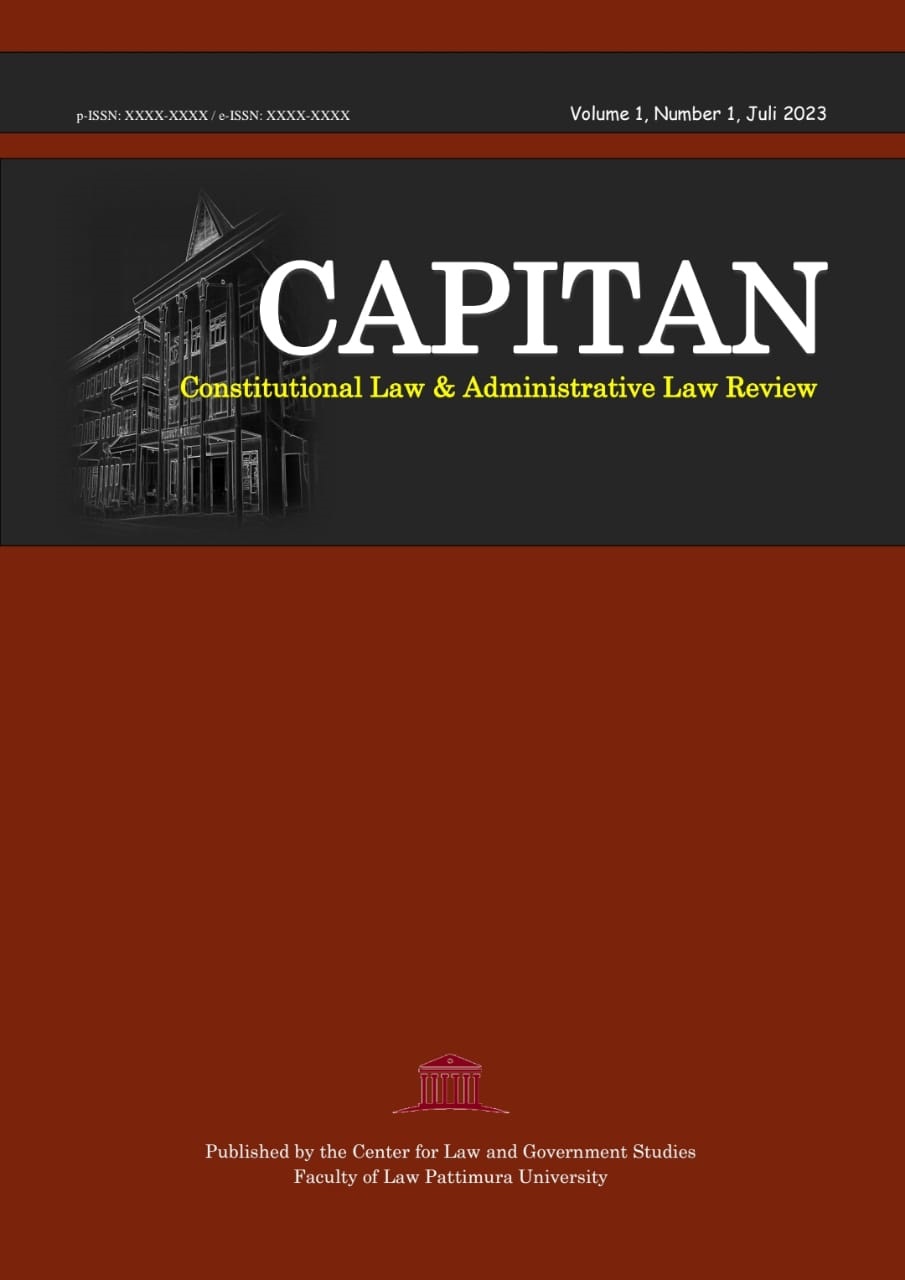Kewenangan Pemerintah Daerah Dalam Penertiban Orang Dengan Gangguan Jiwa
Abstract
Mental disorders are conditions that require serious attention and handling by the government. Local governments have the authority to address mental health issues, but this authority still needs to be clarified and accounted for. The problem of mental disorders is a health issue that requires special and continuous handling. Local governments play an important role in ensuring effective and humane treatment of people with mental disorders (ODGJ), in accordance with applicable laws and regulations. The research method used is normative juridical. It employs problem approaches such as conceptual approaches and legal regulations approaches. The legal sources used include primary, secondary, and tertiary legal materials. The collection of legal materials is conducted through literature studies, which are then analyzed qualitatively. The research findings indicate that local governments have full authority to regulate ODGJ in public facilities; however, the implementation of policies in the field has not been optimal. This is due to the inconsistency of the government in regulating ODGJ in public facilities, a lack of trained human resources, and the negative stigma toward ODGJ in society. The study also finds that coordination among local governments, relevant agencies (such as the Social Service and Health Department), and the community needs to be improved to ensure proper and sustainable handling. Local governments also need to strengthen their capacity and coordination in the regulation and management of ODGJ.
Downloads
References
Achmad Ali, Menguak Tabir Hukum, Jakarta: Edisi 2, Kencana, 2015.
Diky Pranata Kusuma, Kewenangan Pejabat Pemerintahan Dalam Hukum Administrasi Negara, Jambi: Analisis Kebijakan Ahli Pertama Kanwil Kemenag, 2020.
http://repository.poltekes-denpasar.ac.id.
https://dpmpt.kulonprogokab.go.id/detil/508/pelayanan-publik#.
https://mmc.kalteng,go,id/berita/read/9334/odgj-katagori-penyandang-masalah-sosial.
https://ombudsman.go.id/artikel/r/artikel--ombudsman-sebagai-alternatif-penyelesaian-masalah.
https://www.kemkes.go.id/article/print/16100700005/peran-keluarga-dukung kesehatan-jiwa-masyarakat.html.
https://www.psychiatry.org/patients-families/what-is-mental-illness.
I Gede Febri Putra, Lapor ke Ombudsman RI Sebagai Cara Tepat Mengkritik Pemerintah, Artikel, Ombudsman Republik Indonesia, 25 Februari (2021),
Komang Ema Marsitadewi, ddk., Education for Communities in Dealing with People with Mental Disorders in the Context of Community Peace in Abiansemal Village, (Bandung: Regency, 2019).
Koranelao Abdul Latif, dkk., “Kewenangan Penjabat Negeri Dalam Pengangkatan Dan Pemberhentian Saniri Negeri Laha Kaba Kecamatan Telutih Kabupaten Maluku Tengah”, Pattimura Law Study Review, (2023).
Marwan Mas, Pengantar Ilmu Hukum, Bogor; Ghalia Indonesia, 2003.
Reni H. Nendissa, dan Erik S. Holle, Hukum Wewenang, Ambon: Pattimura Universitas Press, 2023.
Sanchaya, Kadek Putra, dkk., Hubungan Dukungan Keluarga Dengan Kualitas Hidup Orang Dengan Gangguan Jiwa, (Jawa Tengah: 2018).
Tim Penyusun, “Perlindungan Hukum Orang Dengan Ganguggan Jiwa (ODGJ) Dirumah Sakit Khusus Jiwa”, Wal ‘allfiat Hospital Journal: Jurnal Nakes Rumah Sakit, Vol 1, No 1, (2020).
Yudi Purnomo, “Sebaran Fasilitas Pelayanan Publik Dan Pilihan Masyarakat Di Kecamatan Pontianak Utara, Kota Pontianak”, Jurnal Langkau Betang, Vol. 4, No. 2, Tahun (2017).
www.trito.id.
Copyright (c) 2025 Derek Talaksoru, Jemmy Jefry Pietersz, Miracle Soplanit (Author)

This work is licensed under a Creative Commons Attribution-NonCommercial 4.0 International License.
Authors who publish their manuscripts in this Journal agree to the following conditions:
- The copyright in each article belongs to the author, as well as the right to patent.
- Authors are able to enter into separate, additional contractual arrangements for the non-exclusive distribution of the journal's published version of the work (e.g., post it to an institutional repository or publish it in a book), with an acknowledgment of its initial publication in this journal.
- Authors are permitted and encouraged to post their work online (e.g., in institutional repositories or on their website) prior to and during the submission process, as it can lead to productive exchanges, as well as earlier and greater citation of published work.
- Authors have the right to self-archiving of the article (Author Self-Archiving Policy)













